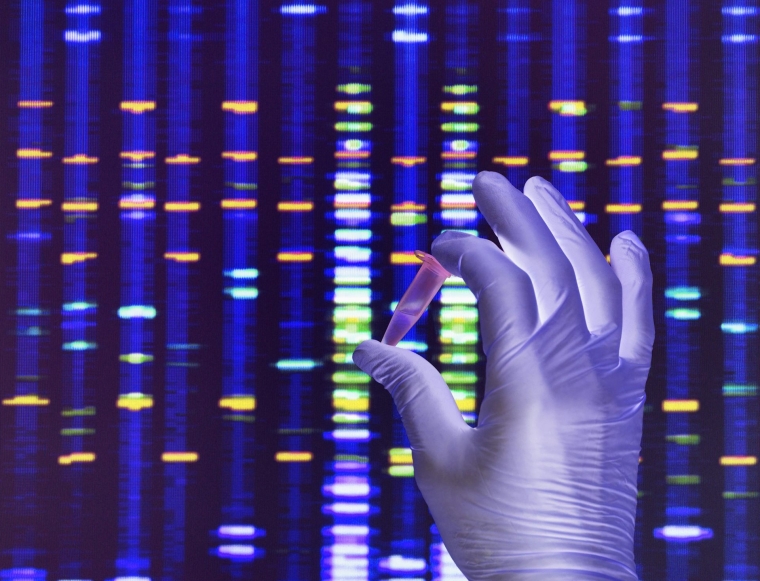
Imagine this: a novel virus is rapidly breaking out nationwide, resulting in an epidemic. The government introduces vaccination mandates and a choice of different vaccines is available.
But not everyone is getting the same vaccine. When you sign up for vaccination, you are sent a vial with instructions to send a sample of your saliva to the nearest laboratory. Just a few hours later you receive a message telling you which vaccine you should get. Your neighbour also signed up for vaccination. But their vaccine is different from yours.
Both of you are now vaccinated and protected, although each of you received your vaccines depending on “who you are”. Your genetics, age, gender, and myriad of other factors are captured in a “model” that predicts and determines the best option to protect you from the virus.
It all sounds a bit like science fiction. But since the decoding of the human genome in 2003, we have entered the age of precision prevention.
New Zealand has a long-standing newborn screening programme. This includes genome sequencing machines available nationwide and a genetic health service. Programmes such as these open up the possibilities of public health genomics and precision public health for everyone.
The further expansion of these programmes, as well as the expansion of the use of artificial intelligence and machine learning to enable a shift to more personalised preventive care, will change how public health care is delivered.
At the same time, these developments raise wider concerns over individual choice versus the greater good, personal privacy, and who is responsible for the protection of New Zealanders and their health information.
What is precision prevention?
Think of precision prevention (also known as personalised prevention) as public health action tailored to the individual rather than broader groups of society.
This targeted healthcare is achieved by balancing a range of variables (including your genes, life history and environment) with your risks (including everything that changes within you as you grow older).
While advances in genomics are making precision prevention possible, machine learning algorithms fuelled by our personal data have made it closer to a reality.
We generate data about ourselves every day – via social media, smartwatches and other wearable devices – helping to train algorithms to match medical prevention measures with individuals.
Combine all of these with AI-driven predictive modelling, and you have a system that can predict the current and future state of your health with an eerie level of accuracy, and help you take steps to prevent disease.
Safety and delay
The Prime Minister’s Chief Science Advisor recently published a report mapping out the landscape of artificial intelligence and machine learning in New Zealand over the next five years.
While the report authors didn’t specifically reference “precision prevention”, they did include examples of this approach, such as computer vision augmented mammography.
But as the report suggests, adoption tends to fall behind the pace of innovation in AI. Te Whatu Ora–Health New Zealand has also not approved emerging large language models and generative artificial intelligence tools as safe and effective for use in healthcare.
This means generative AI-driven precision prevention practices, such as conversational AI for public health messaging, may have to wait before they can be deemed safe to use.
Move forward with caution
There is much to be excited about the prospects of the use of artificial intelligence and machine learning in ushering in a new age of precision prevention and preventive health. But at the same time, we must temper this with caution.
Artificial intelligence and machine learning may increase access and utilisation of healthcare by lowering barriers to medical knowledge and reducing human bias. But government and medical agencies need to reduce barriers related to digital literacy and access to online platforms.
For those with limited access to online resources or who have limited digital literacy, the already existent inequity of access to care and health could worsen.
Artificial intelligence also has a significant environmental impact. One study found several common large AI models can emit over 270,000 tonnes of carbon dioxide during their life cycle.
Finally, technology is a shifting landscape. Proponents of precision healthcare must be careful with children and marginalised communities and their access to resources. Maintaining privacy and choice is essential – everyone should be in a position to control what they share with the AI agents.
In the end, each of us is different, and we all have our different needs for our health and for our lives. Moving more people to preventive care through precision healthcare will reduce the financial burden on the health system.
But as the report from the prime minister’s chief science officer emphasises, machine learning algorithms are a nascent field. We need more public education and awareness before the technology becomes part of our everyday lives.![]()
*Arindam Basu, Associate Professor, Epidemiology and Environmental Health, University of Canterbury. This article is republished from The Conversation under a Creative Commons license. Read the original article.
3 Comments
AI. Artificial Intelligence. Well the health system needs to do some ordinary intelligence first.
Like "do the math" on our post code lottery
eg: Population big in one place. Few specialist services there. Population same in another place. Squads of specialist services.
Solution. Move something around.
You could work out what's appropriate with some simple ole fashioned sums.
Like big data, wearable tech, databases etc. where all going to transform healthcare?
Don't tell me AI is going to change the world. Show me.
This article 'feels' incomplete and perhaps should have been published in the NZ Herald. Pharmaco-genomics is a well established field. Why do some people respond to a drug and others don't. The classic example is clopidogrel, responders vs non-responders.
Th decoding of the huma genome was meant to give numerous insights into disease and subsequent treatments. I'm happy to be called out but I do not think a single treatment can lay claim to having its birth in the Human Genome Project. Google Craig Venter for an interesting read.

We welcome your comments below. If you are not already registered, please register to comment
Remember we welcome robust, respectful and insightful debate. We don't welcome abusive or defamatory comments and will de-register those repeatedly making such comments. Our current comment policy is here.